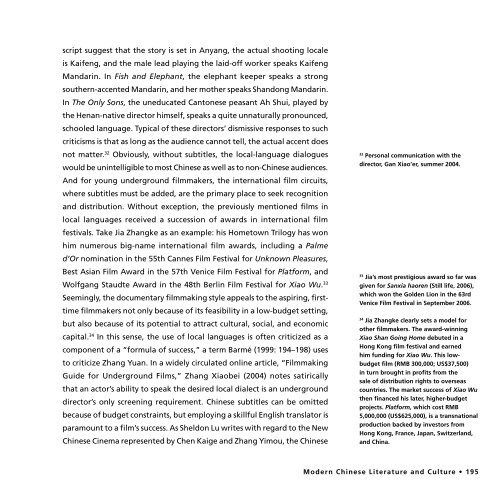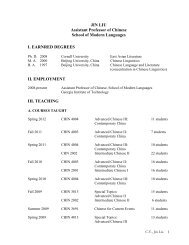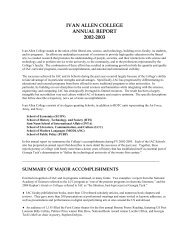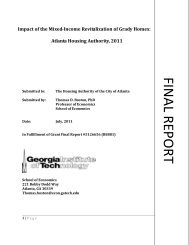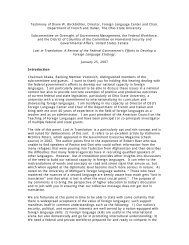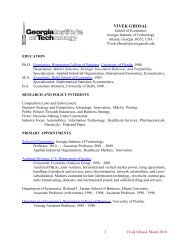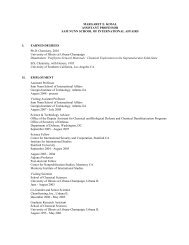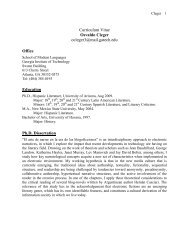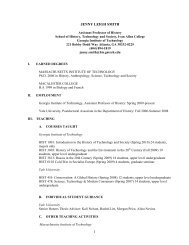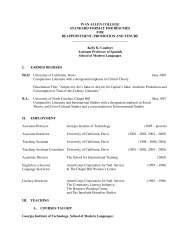Read this paper
Read this paper
Read this paper
Create successful ePaper yourself
Turn your PDF publications into a flip-book with our unique Google optimized e-Paper software.
script suggest that the story is set in Anyang, the actual shooting locale<br />
is Kaifeng, and the male lead playing the laid-off worker speaks Kaifeng<br />
Mandarin. In Fish and Elephant, the elephant keeper speaks a strong<br />
southern-accented Mandarin, and her mother speaks Shandong Mandarin.<br />
In The Only Sons, the uneducated Cantonese peasant Ah Shui, played by<br />
the Henan-native director himself, speaks a quite unnaturally pronounced,<br />
schooled language. Typical of these directors’ dismissive responses to such<br />
criticisms is that as long as the audience cannot tell, the actual accent does<br />
not matter. 32 Obviously, without subtitles, the local-language dialogues<br />
would be unintelligible to most Chinese as well as to non-Chinese audiences.<br />
And for young underground filmmakers, the international film circuits,<br />
where subtitles must be added, are the primary place to seek recognition<br />
and distribution. Without exception, the previously mentioned films in<br />
local languages received a succession of awards in international film<br />
festivals. Take Jia Zhangke as an example: his Hometown Trilogy has won<br />
him numerous big-name international film awards, including a Palme<br />
d’Or nomination in the 55th Cannes Film Festival for Unknown Pleasures,<br />
Best Asian Film Award in the 57th Venice Film Festival for Platform, and<br />
Wolfgang Staudte Award in the 48th Berlin Film Festival for Xiao Wu. 33<br />
Seemingly, the documentary filmmaking style appeals to the aspiring, firsttime<br />
filmmakers not only because of its feasibility in a low-budget setting,<br />
but also because of its potential to attract cultural, social, and economic<br />
capital. 34 In <strong>this</strong> sense, the use of local languages is often criticized as a<br />
component of a “formula of success,” a term Barmé (1999: 194–198) uses<br />
to criticize Zhang Yuan. In a widely circulated online article, “Filmmaking<br />
Guide for Underground Films,” Zhang Xiaobei (2004) notes satirically<br />
that an actor’s ability to speak the desired local dialect is an underground<br />
director’s only screening requirement. Chinese subtitles can be omitted<br />
because of budget constraints, but employing a skillful English translator is<br />
paramount to a film’s success. As Sheldon Lu writes with regard to the New<br />
Chinese Cinema represented by Chen Kaige and Zhang Yimou, the Chinese<br />
32<br />
Personal communication with the<br />
director, Gan Xiao’er, summer 2004.<br />
33<br />
Jia’s most prestigious award so far was<br />
given for Sanxia haoren (Still life, 2006),<br />
which won the Golden Lion in the 63rd<br />
Venice Film Festival in September 2006.<br />
34<br />
Jia Zhangke clearly sets a model for<br />
other filmmakers. The award-winning<br />
Xiao Shan Going Home debuted in a<br />
Hong Kong film festival and earned<br />
him funding for Xiao Wu. This lowbudget<br />
film (RMB 300,000; US$37,500)<br />
in turn brought in profits from the<br />
sale of distribution rights to overseas<br />
countries. The market success of Xiao Wu<br />
then financed his later, higher-budget<br />
projects. Platform, which cost RMB<br />
5,000,000 (US$625,000), is a transnational<br />
production backed by investors from<br />
Hong Kong, France, Japan, Switzerland,<br />
and China.<br />
Modern Chinese Literature and Culture • 195<br />
MCLC 18.2.indd 195<br />
12/20/06 2:01:40 PM


